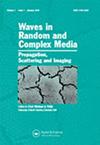Detection of laser beams based on intensity interferometry
3区 物理与天体物理
Q1 Engineering
引用次数: 0
Abstract
AbstractWe describe an approach to detecting off-axis radiation of laser beams propagating in scattering media, especially in the atmosphere, in the presence of background (solar) radiation. The method relies on a generalization of the conventional intensity interferometry (II) theory to scenarios involving coexisting sources of relatively long (laser radiation) and much shorter (background) coherence times. In such circumstances, the high coherence of the laser light allows its discrimination against even much stronger, but low-coherence, background. We propose a simple detection system consisting of a small array of photodetectors (e.g. photodiodes) and estimate the ratio of the background-to-laser irradiances at which the laser radiation is expected to be detectable.Keywords: Laser radiationscatteringcoherencesolar backgroundintensity interferometry Disclosure statementNo potential conflict of interest was reported by the author(s).Notes1 Outweighed, at the time, by its insensitivity to detrimental effects of atmospheric turbulence, as discussed following Equation (Equation3(3) C(ϱ0):=⟨ΔJ(ϱ0/2)ΔJ(−ϱ0/2)⟩g(1)⟨(ΔJ(ϱ0/2))2⟩⟨(ΔJ(−ϱ0/2))2⟩≡⟨ΔJ+ΔJ−⟩g(1)⟨(ΔJ+)2⟩⟨(ΔJ−)2⟩,(3) ).2 In the definition (Equation2(2) δ=12ΔτηEA,(2) ) it is assumed that the aperture area is much smaller than the radiation's coherence area (as defined below, Equations (Equation55a(55a) ΔAjc=∫d2ϱFjc(ϱ)=π2Δϱjc∥Δϱjc⊥=λ2RπϕwjB≈1.27mm2(55a) )). In general, A has to be replaced with the aperture autocorrelation area, discussed in Section 3.3 We will, alternatively, express irradiance in units of watts per meter squared, by using the conversion factor 1W/m2=(λ/hc)photons/s≈7.5⋅1018photons/(sm2), the last numerical value corresponding to the SWIR wavelength λ=1.5μm.4 An exhaustive overview of the literature is given in the recent dissertation [Citation20].5 By a photosensor we mean a ‘single-pixel’ photodetector, such as a PIN photodiode, an avalanche photodiode, etc.6 Equation (Equation5(5) I±(t):=∫P±d2ϱ′|uP(t,ϱ′)|2≈∫Aj±d2ϱ|u(t,ϱ)|2,(5) ) implies that the ensemble average of the intensity is given by the surface integral of the irradiance.7 In fact, in SII one can also go beyond the approximations valid for very small apertures and introduce a ‘partial coherence factor’ Δ associated with larger apertures of the telescopes ([Citation27], Appendix A and [Citation2, p. 60]). Our Equations (Equation16b(16b) ⟨ΔI±(12τ)ΔI±(−12τ)⟩≈12|γ(τ)|2E2∫Aj±d2ϱ1∫A±d2ϱ2F(ϱ1−ϱ2)≡12|γ(τ)|2E2A±A¯±(16b) ) and (Equation16c(16c) ⟨ΔI+(12τ)ΔI−(−12τ)⟩≈12|γ(τ)|2E2∫Aj+d2ϱ1∫A−d2ϱ2F(ϱ1−ϱ2)≡12|γ(τ)|2E2g(1)A+A−A¯j+−,(16c) ) provide a generalization of these results.8 In the following, we will use either the frequency or the wavelength, always assuming ω=2πc/λ.9 We add here the superscript ϕ to emphasize the irradiance's dependence on the detector FOV.10 For reasons mentioned below, we neglect here L compared to R.11 We use here the symbol Jinc to differentiate this function from the conventional jinc(x)=2J1(πx)/(πx).12 Any effects of possible optical filters have also to be taken into account in the integral (Equation49(49) ∫dωη(ω)Γjbω(0;0,0)=∫dω2πη(ω)dEbϕ(ω)dω/2π≡[ηEbϕ]tot=Ωjϕ∫dωη(ω)Ijb(ω),(49) ).13 Derivation of the expression for the function V(t) in Equation (Equation52(52) V(t)=2π(cos−1t−t1−t2)fort≤1,V(t)=0otherwise,(52) ) can be found, e.g. in [Citation32], Figure 6, where a similar aperture geometry problem is analyzed.14 Although (by Equation (Equation23(23) δ¯j±:=12ΔτηEA¯±andδ¯j+−:=12ΔτηEA¯j+−,satisfyingδ¯j+−≤(δ¯j+δ¯j−)1/2.(23) )) δ¯±c in the denominator are, generally, larger than δ¯+−c appearing in the numerator, estimates of Section 5.1 suggest that the difference is not significant.15 We recall that our elementary detector is a lens focusing light on a single-pixel photosensor.16 The laser beam expected to be relatively stable, as it has to track the target. Although the target may be moving, the beam direction would be unlikely to change appreciably.Additional informationFundingThis material is based upon work supported by the U.S. Air Force Office of Scientific Research under award number FA 9550-19-1-0144.基于强度干涉法的激光束检测
摘要本文描述了一种检测激光光束在散射介质中,特别是在大气中存在背景(太阳)辐射时的离轴辐射的方法。该方法将传统的强度干涉测量(II)理论推广到涉及相对较长(激光辐射)和较短(背景)相干时间共存源的场景。在这种情况下,激光的高相干性使其能够识别更强但低相干的背景。我们提出了一个简单的检测系统,由一个小阵列的光电探测器(如光电二极管)组成,并估计了背景与激光辐照度的比例,在这个比例下,激光辐射有望被检测到。关键词:激光辐射散射相干性太阳背景密度干涉测量披露声明作者未报告潜在利益冲突。Notes1盖过,当时,无视有害大气湍流的影响,如下讨论方程(Equation3 (3) C(ϱ0):=⟨ΔJ(ϱ0/2)ΔJ(−ϱ0/2)⟩g(1)⟨(ΔJ(ϱ0/2))2⟩⟨(ΔJ(−ϱ0/2))2⟩≡⟨ΔJ +Δ−⟩g(1)⟨(ΔJ +) 2⟩⟨(ΔJ−)2⟩,(3))。2在定义(方程2(2)δ=12ΔτηEA,(2))中,假设孔径面积远小于辐射的相干面积(定义如下,方程(方程55a(55a) ΔAjc=∫d2ϱFjc(ϱ)=π2Δϱjc∥Δϱjc⊥=λ 2rπ wjb≈1.27mm2(55a)))。一般来说,A必须用孔径自相关面积代替,在3.3节中讨论。我们也可以用换算系数1W/m2=(λ/hc)光子/s≈7.5⋅1018光子/(sm2)表示辐照度,最后一个数值对应于SWIR波长λ=1.5μm.4在最近的论文[Citation20]中给出了文献的详尽概述我们所说的光敏器是指“单像素”光电探测器,如PIN光电二极管、雪崩光电二极管等。方程(方程5(5)I±(t):=∫P±d2ϱ ' |uP(t,ϱ ')|2≈∫Aj±d2ϱ|u(t,ϱ)|2,(5))表明,强度的系综平均值由辐照度的表面积分给出事实上,在SII中,人们也可以超越对非常小的孔径有效的近似,并引入与望远镜的大孔径相关的“部分相干系数”Δ ([Citation27],附录a和[Citation2,第60页])。我们的方程(Equation16b (16 b)⟨Δ我±(12τ)Δ我±(−12τ)⟩≈12 |γ(τ)| 2 e2∫Aj±d2ϱ1∫±d2ϱ2 f(ϱ1−ϱ2)≡12 |γ|(τ)2 ea2±¯±(16 b))和(Equation16c (16 c)⟨Δ我+(12τ)Δ−−12τ⟩≈12 |γ(τ)| 2 e2∫Aj + d2ϱ1∫−d2ϱ2 f(ϱ1−ϱ2)≡12 |γ(τ)| 2 e2g(1) +一个¯j +−−,(c) 16日)提供一个概括的结论。在下面,我们将使用频率或波长,总是假设ω=2πc/λ.9我们在这里添加上标φ来强调辐照度对探测器FOV.10的依赖。由于下面提到的原因,我们在这里忽略L与R.11相比。我们在这里使用符号Jinc来区分这个函数与传统的Jinc (x)=2J1(πx)/(πx).12任何可能的滤光片的影响也必须在积分中考虑(方程49(49)∫dωη(ω)Γjbω(0;0,0)=∫dω2πη(ω)dEbϕ(ω)dω/2π≡[η eϕ]tot=Ωjϕ∫dωη(ω)Ijb(ω),(49))方程(Equation52(52)) V(t)=2π(cos−1 (t−t1−t2) = 1,V(t)=0,否则(52))中函数V(t)的表达式的推导可以找到,例如在[Citation32],图6,其中分析了类似的孔径几何问题虽然(由公式(Equation (23)) δ¯j±:=12ΔτηEA¯±和δ¯j+−:=12ΔτηEA¯j+−,满足δ¯j+−≤(δ¯j+δ¯j−)1/2.(23)))分母中的δ¯±c通常大于分子中的δ¯+−c,但第5.1节的估计表明差异并不显著我们记得,我们的初级探测器是一个透镜,将光聚焦在一个单像素的光电传感器上激光束应该是相对稳定的,因为它必须跟踪目标。虽然目标可能在移动,但光束的方向不太可能发生明显的变化。本材料基于美国空军科学研究办公室支持的工作,授予编号FA 9550-19-1-0144。
本文章由计算机程序翻译,如有差异,请以英文原文为准。
求助全文
约1分钟内获得全文
求助全文
来源期刊

Waves in Random and Complex Media
物理-物理:综合
自引率
0.00%
发文量
677
审稿时长
3.0 months
期刊介绍:
Waves in Random and Complex Media (formerly Waves in Random Media ) is a broad, interdisciplinary journal that reports theoretical, applied and experimental research related to any wave phenomena.
The field of wave phenomena is all-pervading, fast-moving and exciting; more and more, researchers are looking for a journal which addresses the understanding of wave-matter interactions in increasingly complex natural and engineered media. With its foundations in the scattering and propagation community, Waves in Random and Complex Media is becoming a key forum for research in both established fields such as imaging through turbulence, as well as emerging fields such as metamaterials.
The Journal is of interest to scientists and engineers working in the field of wave propagation, scattering and imaging in random or complex media. Papers on theoretical developments, experimental results and analytical/numerical studies are considered for publication, as are deterministic problems when also linked to random or complex media. Papers are expected to report original work, and must be comprehensible and of general interest to the broad community working with wave phenomena.
 求助内容:
求助内容: 应助结果提醒方式:
应助结果提醒方式:


